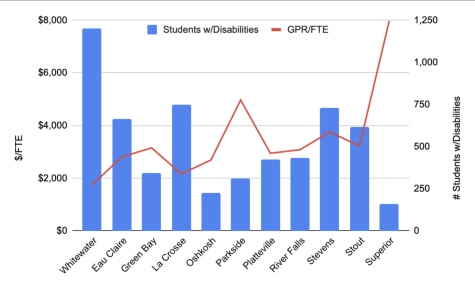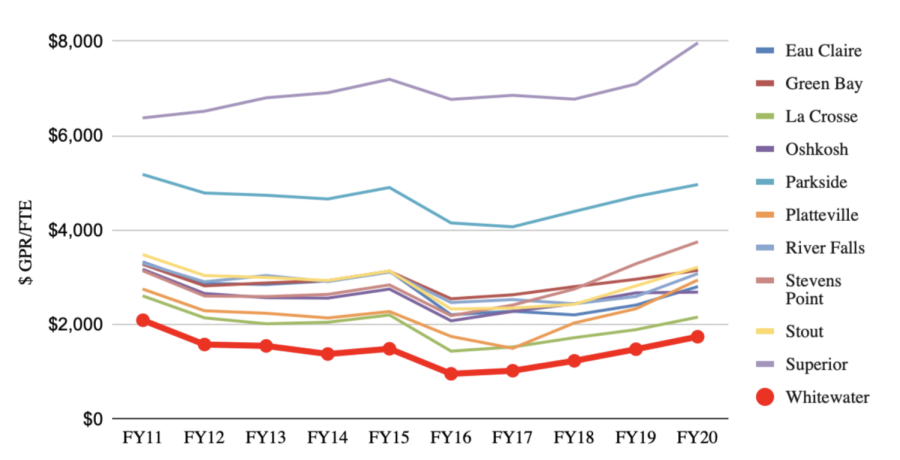Whitewater receives least funding in entire UW System
April 24, 2022
Conversations surrounding the effects of UW-Whitewater’s 2020 budget crisis have been consistent in the past few years as the institution rebounds from lower enrollment and the COVID-19 pandemic. However, the disparities in General Purpose Revenue (GPR) funding of UW universities that might have contributed to this have been left widely unnoticed.
UW-W associate professor of geology, geography and environmental science Eric Compas has been working to bring awareness to UW-Whitewater’s lack of funding from the UW System, which he presented at a recent Faculty Senate meeting Tuesday, April 12. With help from Chief of Institutional Research and Planning Lynsey Schwabrow, they compiled data comparing GPR funding for different UW universities per full-time equivalent (PTE) student.

“I’ve known for over ten years that we’ve gotten a smaller proportion of state funding compared to other campuses,” said Compas. “It wasn’t until we pulled that data together that we realized the magnitude.”
One of the most shocking findings was that UW-Whitewater received approximately $1,500 less in funding per full-time student than the average of other UW System universities. In comparison, UW-Superior acquired roughly $8,000 in GPR Funding in 2020.
“Now we know that Superior – because they’re a smaller institution – they’ll need additional support from the state to be able to thrive and survive. We have no intention of hurting Superior. We want Superior to continue as an institution,” said UW-W secondary social studies program coordinator James Hartwick. “But at some point, it’s just an equity argument. It’s a fairness argument. Our students are being shorted because their institution is not getting adequately supported.”
Through his presentations, Compas calls attention to the impacts that a funding disparity of this magnitude can have on Whitewater.
“In the calculation of how much each campus should get, there should be this consideration of what makes each campus unique and why they might need more or less funding,” said Compas. “We have a significant number of underrepresented minorities that come to Whitewater. The discussion across the state about diversity and inclusiveness is that underrepresented minorities often come from disadvantaged backgrounds and often require additional services that need more money. We also have the largest group of students with disabilities, and those students definitely need additional services.”
This is not the only conversation being had surrounding disparities in the amount of money Wisconsin institutions are receiving. At a March 10 meeting, the Wisconsin Assembly Committee on Colleges and Universities discussed the 2021 Assembly Bill 1108.
It states, “This bill requires that, by July 1, 2031, the Board of Regents allocate to all UW institutions, other than UW-Madison and UW-Milwaukee, an equal amount of GPR funding, excluding performance funding, per full-time equivalent undergraduate student enrolled at the institution. “

The desire to make a change is alive in sponsors of the bill Rep. Horlacher, Rep. Vruwink and Assembly Speaker Vos, who are also UW-W alums.
Meanwhile, Compas and Hartwick both hope for an even more equitable distribution of funding. Assembly Bill 1108 would allocate funds equally based on FTE. As of now, the Wisconsin Legislature gives the UW System a set amount of funds to distribute. The Board of Regents decides the amount each university receives through a classified formula. Compas expects this data will make them choose to update the formula and reallocate funds.
“We talk a lot about diversity and equity, and this is an opportunity to actually make a difference. We find all kinds of well-written statements on UW System’s website about how important diversity and equity is to the UW System. This is their chance to show that they actually mean it,” said Compas. “There’s a new system president… so when you think about when things would change, having a new system president is one of those opportunities to make a change in the way the system works.”
Compas is currently is in the works to showcase this data to the Wisconsin Assembly Committee on Colleges and Universities, along with continuing discussions with the UW System Board of Regents.
“What we’re finding is that when you educate people about it – when they begin to see the vastness of the difference – then people wake up and they get upset about it. They think it’s unfair. And we saw that with the legislature, we’ve seen that with members of the Board of Regents,” said Compas. “If you don’t talk about your oppression, then the oppression never goes away.”
The Board of Regents is set to consider the funding of UW schools using various factors in the near future.
“The Board of Regents will be reviewing the current allocation model in the coming months,” said UW System public relations specialist Ethan Schuh. “And will consider a number of financial factors, including tuition revenue, the cost of maintaining facilities, and other revenue sources available to each university as part of that review.”
Interim Chancellor Chenoweth ensures that he is aware of this issue and doing his part as well.
“I’ve already been involved in some conversations. I think everyone is sort of aware of the issue. Everyone can look at the numbers and see that we’re not where we should be,” said Chenoweth. “I think that the Regents and others still have work to do to figure out exactly why the formula is what it is. We’re hopeful there’s going to be some changes.”













